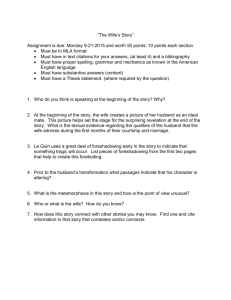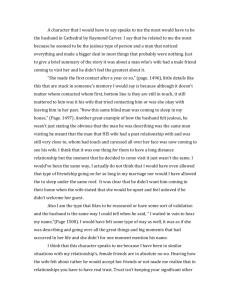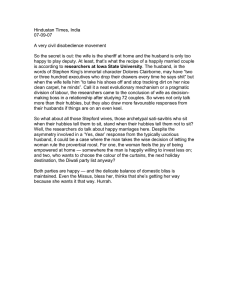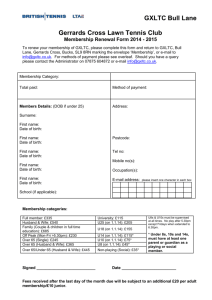LOYOLA COLLEGE (AUTONOMOUS), CHENNAI – 600 034
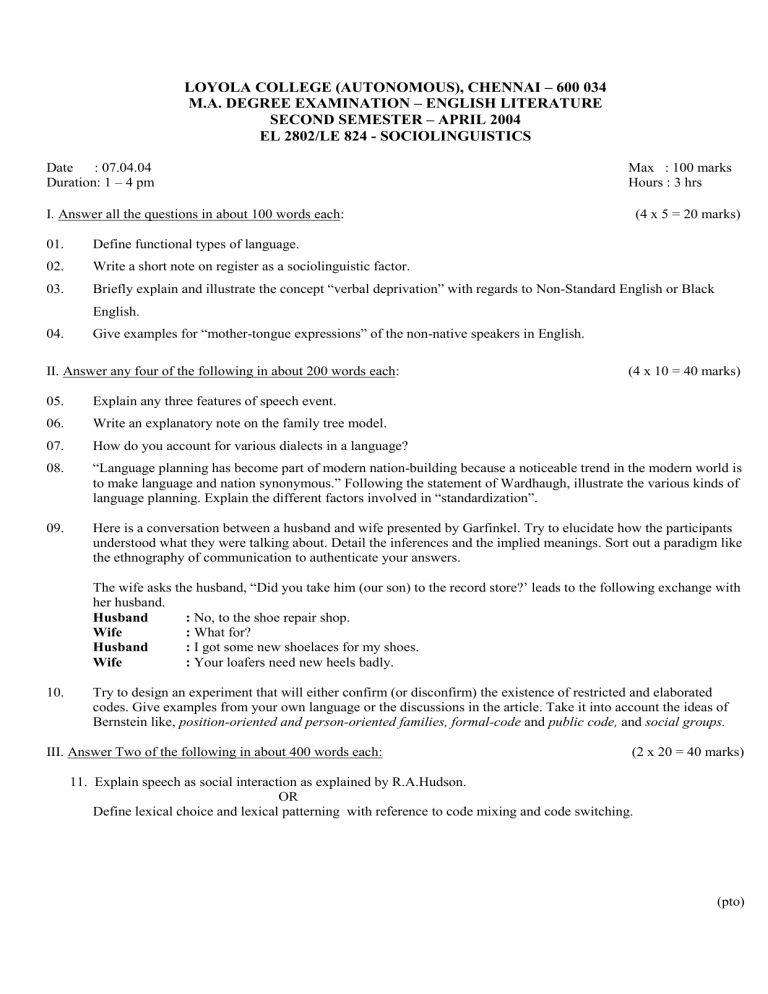
LOYOLA COLLEGE (AUTONOMOUS), CHENNAI – 600 034
M.A. DEGREE EXAMINATION – ENGLISH LITERATURE
SECOND SEMESTER – APRIL 2004
EL 2802/LE 824 - SOCIOLINGUISTICS
Date : 07.04.04
Duration: 1 – 4 pm
I. Answer all the questions in about 100 words each:
01.
Define functional types of language.
Max : 100 marks
Hours : 3 hrs
(4 x 5 = 20 marks)
02.
Write a short note on register as a sociolinguistic factor.
03.
Briefly explain and illustrate the concept “verbal deprivation” with regards to Non-Standard English or Black
English.
04.
Give examples for “mother-tongue expressions” of the non-native speakers in English.
II. Answer any four of the following in about 200 words each:
05.
Explain any three features of speech event.
06.
Write an explanatory note on the family tree model.
(4 x 10 = 40 marks)
07.
How do you account for various dialects in a language?
08.
“Language planning has become part of modern nation-building because a noticeable trend in the modern world is to make language and nation synonymous.” Following the statement of Wardhaugh, illustrate the various kinds of language planning. Explain the different factors involved in “standardization”.
09.
Here is a conversation between a husband and wife presented by Garfinkel. Try to elucidate how the participants understood what they were talking about. Detail the inferences and the implied meanings. Sort out a paradigm like the ethnography of communication to authenticate your answers.
The wife asks the husband, “Did you take him (our son) to the record store?’ leads to the following exchange with her husband.
Husband
Wife
Husband
Wife
: No, to the shoe repair shop.
: What for?
: I got some new shoelaces for my shoes.
: Your loafers need new heels badly.
10.
Try to design an experiment that will either confirm (or disconfirm) the existence of restricted and elaborated codes. Give examples from your own language or the discussions in the article. Take it into account the ideas of
Bernstein like, position-oriented and person-oriented families, formal-code and public code, and social groups.
III. Answer Two of the following in about 400 words each: (2 x 20 = 40 marks)
11. Explain speech as social interaction as explained by R.A.Hudson.
OR
Define lexical choice and lexical patterning with reference to code mixing and code switching.
(pto)
-2-
12.
Illustrate the views of Whorf, on the basis of how language determines the way in which the speakers of that language view the world from the passage given below.
“the background linguistic system (in other words, the grammar) of each language is not merely a reproducing instrument for voicing ideas but rather is itself the shaper of ideas, the program and guide for the individual’s mental activity, for his analysis of impressions, for his synthesis of his mental stock in trade. Formulation of ideas is not an independent process, strictly rational in the old sense, but it’s a part of particular grammar, and differs, from slightly to greatly, between different grammars…The world is presented in kaleidoscopic flux of impressions which has to be organized by our minds- and this means largely by the linguistic systems in our minds… We cut nature up and organize it into concepts, and ascribe significances as we do, largely we are parties to an agreement to organize in this way- an agreement that holds throughout our speech community and is codified in the patterns of our language.”
(OR)
-Analyse the following poem sociolinguistically, bringing out the linguistic and societal factors and implications:
My mother told me that she
Learnt to conserve and preserve
From Gandhi,
Who would use a pencil till it had become only a butt
But would put the butt in holder
And use it till it died.
No wonder I said his handwriting was so but that he
Could not read it himself,
Dear old man!
Now in aspiring middle-age, I have not one shirt but
Two dozen, mostly gifted from sugar-daddy in the land of the dollars
Not one trouser but a variety of them Levis to shorts to baggy ones,
Not one cycle but a motorcycle and a motorcar
And a wife and kids each with his and her
Clothes, property, things;
No Gandhi here.
O how I yearn to give away and do
My Haj thing,
Or Tirupathi thing or
Something which will make me
Bald as the dear old man.

